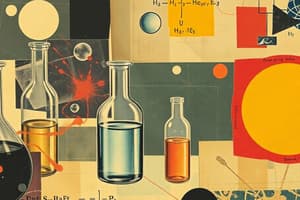Podcast
Questions and Answers
What is a combination reaction in chemistry?
What is a combination reaction in chemistry?
- A reaction involving the exchange of positive and negative ions between two compounds
- A reaction where a complex substance breaks down into simpler ones
- A reaction where two or more simple substances combine to form one or more compounds (correct)
- A reaction where an atom in a compound exchanges places with another atom from another substance
Which type of chemical reaction involves breaking down complex substances into simpler ones?
Which type of chemical reaction involves breaking down complex substances into simpler ones?
- Combination reaction
- Decomposition reaction (correct)
- Single displacement reaction
- Double displacement reaction
What happens in a single displacement reaction?
What happens in a single displacement reaction?
- Complex substances break down into simpler ones
- Two or more simple substances combine to form one or more compounds
- Positive and negative ions are exchanged between two compounds
- An atom in a compound exchanges places with another atom from another substance (correct)
In a double displacement reaction, what occurs?
In a double displacement reaction, what occurs?
When iron reacts with copper sulfate, what compound is formed?
When iron reacts with copper sulfate, what compound is formed?
What is the opposite of a combination reaction?
What is the opposite of a combination reaction?
What is the purpose of balancing chemical equations?
What is the purpose of balancing chemical equations?
Which type of chemical reaction releases energy?
Which type of chemical reaction releases energy?
Why do conservation laws apply to chemical reactions?
Why do conservation laws apply to chemical reactions?
Which type of reaction results in the formation of precipitates?
Which type of reaction results in the formation of precipitates?
What occurs during a neutralization reaction?
What occurs during a neutralization reaction?
Why is balancing equations important in understanding chemical reactions?
Why is balancing equations important in understanding chemical reactions?
Flashcards are hidden until you start studying
Study Notes
Chemical Reactions in Cambridge Science Learner's Book Unit 8.4
In this section of the Cambridge Science Learner's Book, we will delve into the fascinating world of chemical reactions. These processes involve the transformation of one or more substances into different kinds of matter. They often produce new materials with unique properties, making them essential concepts in chemistry. Let's explore some key aspects of chemical reactions covered in Unit 8.4.
Types of Chemical Reactions
There are several types of chemical reactions, each with distinct characteristics:
-
Combination: In this type of reaction, two or more simple substances combine together to form one or more compounds. For example, hydrogen gas and oxygen gas can react to form water.
-
Decomposition: A decomposition reaction is the opposite of a combination reaction. It involves breaking down complex substances into simpler ones. For instance, when ice melts, it decomposes into liquid water and solid water molecules.
-
Single displacement (or exchange): This occurs when an atom in a compound exchanges places with another atom from another substance. For example, when iron reacts with copper sulfate, copper replaces iron in the compound, forming iron sulfate.
-
Double displacement (or metathesis): Double displacement reactions involve the exchange of positive and negative ions between two compounds. For example, if you mix silver nitrate and sodium chloride solutions, they swap their ions, resulting in silver chloride and sodium nitrate.
Balancing Equations
Balancing equations is a crucial skill in understanding chemical reactions. An unbalanced equation means that the number of atoms of each element does not match on both sides of the equation. To balance an equation, chemists make sure there are equal numbers of each kind of atom on both sides of the equation. This shows that in the experiment, the elements involved did indeed react according to the balanced equation.
Energy Changes During Reactions
Some chemical reactions release energy while others absorb it. Exothermic reactions release energy, such as rusting iron which releases iron oxide(rust) and heat. On the other hand, endothermic reactions absorb energy, like the process of dissolving salt in water.
Conservation Laws
The conservation laws apply to chemical reactions because they state that matter cannot be created or destroyed during a chemical reaction. All the mass present before the reaction must still exist after the reaction. Similarly, the law of conservation of charge states that the sum of the charges in a closed system remains constant during any physical or chemical change.
Precipitation Reaction
A precipitation reaction is a type of double displacement reaction where insoluble solids or liquids called precipitates are formed. For example, mixing calcium nitrate and potassium iodide solution results in a white precipitate being formed due to the formation of calcium iodide.
Neutralization Reaction
Neutralization reactions occur when an acid and a base react to produce a salt and water. Acids are proton donors, and bases are proton acceptors. When they react, they neutralize each other, hence the name 'neutralization'. For example, hydrochloric acid and sodium hydroxide will react to form sodium chloride and water.
By studying these various aspects of chemical reactions, students gain a deeper understanding of how matter changes and interacts through different types of reactions. This knowledge forms the foundation for many subsequent studies in chemistry and provides insights into the world around us.
Studying That Suits You
Use AI to generate personalized quizzes and flashcards to suit your learning preferences.




